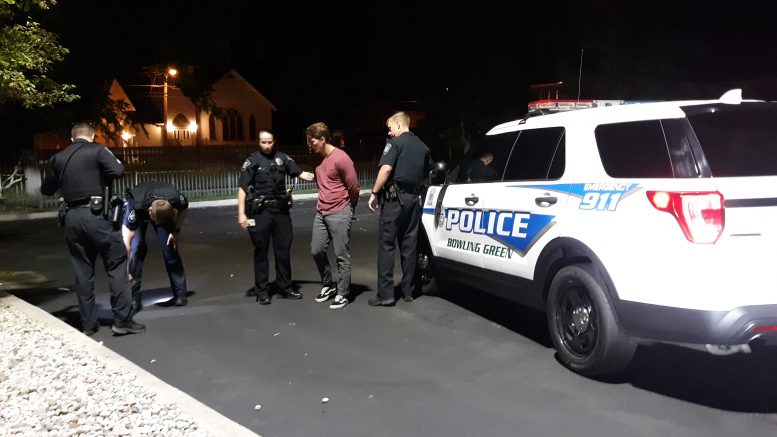By JAN LARSON McLAUGHLIN
BG Independent News
Night shift for Bowling Green Police Division slows down as summer arrives and students pack up for home. But there are still drunk people who do stupid things they likely wouldn’t do if sober. There are still people who hear noises in the night and call for help. And there are still those who physically abuse the people they are supposed to love.
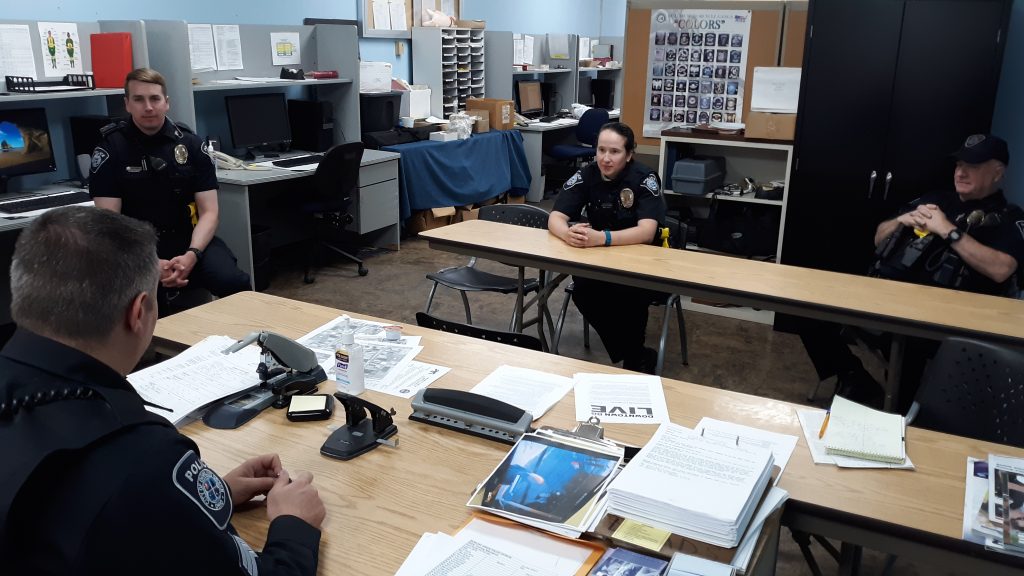
Roll call
On a recent Saturday, the BGPD night shift starts with a typical roll call, led by Sgt. Adam Skaff, a 19-year veteran of the force. He reminds officers about the upcoming Click-it Ticket effort, a canceled search for a suspect from Napoleon, some outstanding warrants, and gives an update on a lost 8-year-old girl.
Then they watch a training video, showing dashcam video of an embarrassing effort by another police force to handle an intoxicated driver. The officers are shown both yelling commands at the suspect and using a Taser on him multiple times.
The BG officers cringe as the dashcam shows the Taser being used on the suspect’s neck, and as the officers struggle to get control and place the Taser on the hood of the car, within reach of the suspect.
The Bowling Green officers identify how the arrest went awry. One person should give commands to the suspect, and a Taser should never be used on the neck. They also talk about how it is more difficult to subdue someone in a more humane appearing manner.
“As opposed to you leg sweeping him to the ground,” Skaff said. “People don’t like that.”
Police are keenly aware that their actions are being watched very carefully. That’s fine with Skaff, who said good police have nothing to fear about their actions being seen. BGPD spends a great deal of time on teaching officers to calm a situation rather than ratchet it up.
“The majority of our training is to de-escalate,” he said.
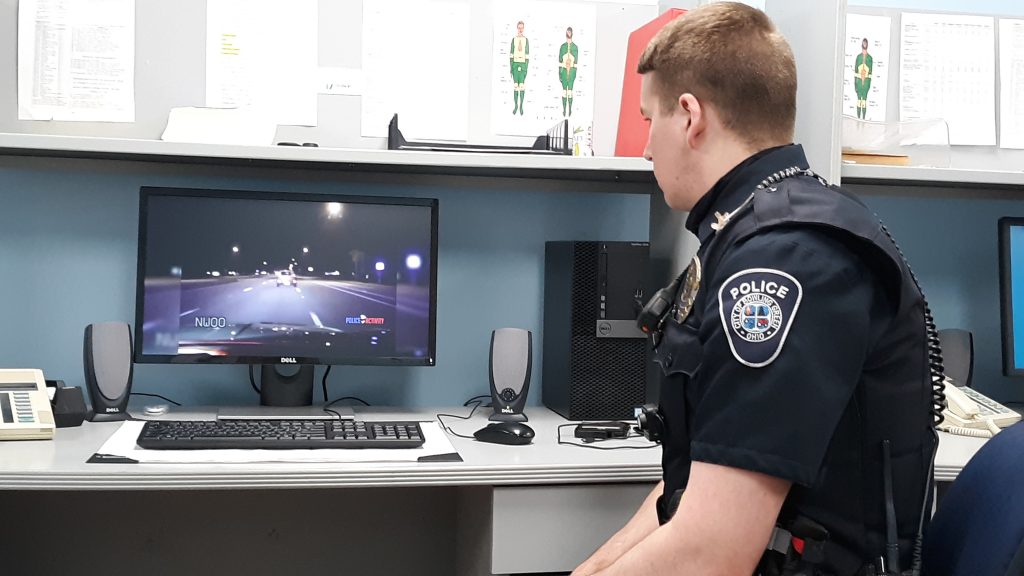
Body cams
BGPD officers welcomed the addition of body cameras last month, according to Skaff, who said the cameras with audio will provide proof that officers are doing a good job.
We think it’s a good thing,” he said. “It’s going to protect us. It’s going to show we’re doing the right thing. If we do what we’re supposed to do, we have nothing to hide.”
BG police have long had dash cameras and back seat cameras in their cruisers to show if a suspect hurts himself after being arrested.
Like the dash cams, the body cameras turn on automatically when officers engage the lights on their squad cars.
For years, the dash cameras have provided valuable footage.
“The cameras have been a big help – from traffic crashes to fights,” Skaff said.
The body camera footage has already helped in the case of a man injured during an arrest. The body camera showed the man was so intoxicated he fell over, Skaff said.
Everytime Skaff – who is BGPD’s liaison with people of color in the community – sees bodycam or cell phone video of police abusing their power, he feels two emotions – sadness for the victim and anger for himself and all decent law enforcement officers.
“It’s giving me a bad name,” he said, explaining that no good police officers can defend actions such as those that killed George Floyd.
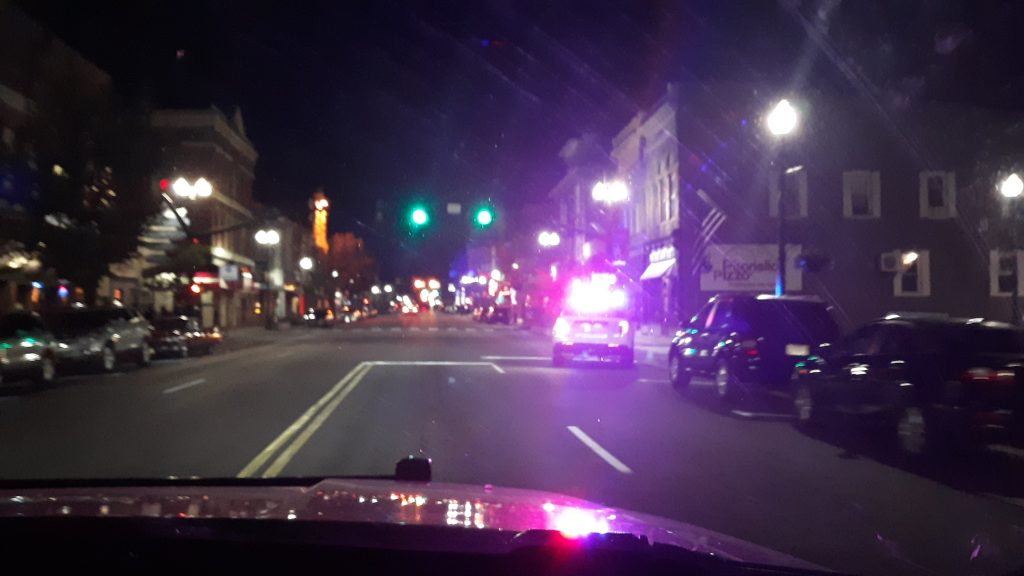
Familiar faces
Skaff estimated 80% of BGPD’s calls involve the same 10% of the city’s population.
Officers responded recently to a call at one frequent address after the man’s children called 911. The police knew the man had treatment scheduled for the next morning, so officers took him to a hotel for the night so his family could have some peace and he would not miss his treatment.
“He was arrested an hour later, trying to kick in the door,” Skaff said.
And sadly, sometimes the problems are passed down through generations – with officers dealing with the grown up children of people they arrested years ago. Some children just can’t escape that cycle, Skaff said.
The same goes for party locations that are repeat problems for police. Though they may change a little from one year to the next, the same rental houses and the same bars are often problems.

Night shift
Skaff, who has patrolled the streets at night for many years, has noticed that problem behaviors keep inching later into the night as students and others head downtown later in the evening.
“It gets later and later,” he said.
Some officers still do foot patrols downtown and around apartment complexes at night.
“It gets you out of the car, and talking with people,” Skaff said.
Uniformed officers who patrol the bars look for underage drinking – which can often be spotted when patrons put down their drinks and head for the door. And while some underage bar-goers go to the effort to memorize a fake birth date so they can pass for legal drinking age, many can’t answer simple questions to back it up, he said.
An officer’s presence in a bar can also prevent fights from breaking out.
“We’re not sitting in plain clothes, waiting to catch people,” Skaff explained.
“Typically, we only deal with people who call attention to themselves,” by urinating on buildings or walking into traffic, he said.
No one gets arrested for jaywalking, “as long as they make some effort to not get hit.”
The same goes for loud parties – which police don’t seek out, he added.
“We’re not shutting down parties unless we have a complaint.”
Skaff is partial to working nights.
“I always like nights – there was so much going on,” he said.
But once most of the students go home for the summer, the calls get fewer and farther between.
“There can be nothing for six hours, then someone gets stabbed,” he said.

Five hours on patrol
It may be slow, but there’s always something … There were calls about loud music, a bar wanting police to remove people who started a fight in the establishment the night before, drunk driving with the driver blowing three times over the limit, and a woman having chest pains after police found open alcohol in her car.
Shortly before midnight, a call came in about a guy punching out a side mirror on a stranger’s car parked downtown. An officer went into a bar and asked if anyone matching the description had just entered. The suspect took off running, and the officer followed. The suspect, a college student, fell behind Taco Bell and the officer said he was so close behind that he fell on top of the suspect.
Meanwhile the suspect’s brother came out from the bar and approached police.
“If there’s a way I could just take him home, that would be better,” the older brother said.
It became clear that the older brother was also intoxicated.
“He’s 21, he’s literally going on 23,” the older brother said, since his younger brother had no identification on him.
Police explained to the suspect why he was put in handcuffs.
“You’re in cuffs because the officer told you to stop and you took off running,” Skaff said.
“I’ve never done anything wrong like that,” the student said. “I respect you guys a lot.”
The owner of the car with the broken mirror drove to Taco Bell to see if the man in custody was the guy who punched his mirror.
“Don’t think that just because he’s in the police car that he is the guy,” Skaff cautioned.
The witness said the man was definitely the guy.
Meanwhile the crowd outside at the bar next door cheered as the suspect got out of the cruiser to be identified by the victim. They booed when he was placed back in the car.
The brother, who initially wanted to bail out his younger sibling, changed his mind when he found out the bail for criminal damaging and obstructing official business was $1,025.
“I’m going to let him sit in jail overnight. I’m going to go back and party,” he said, as he headed back to the bar.
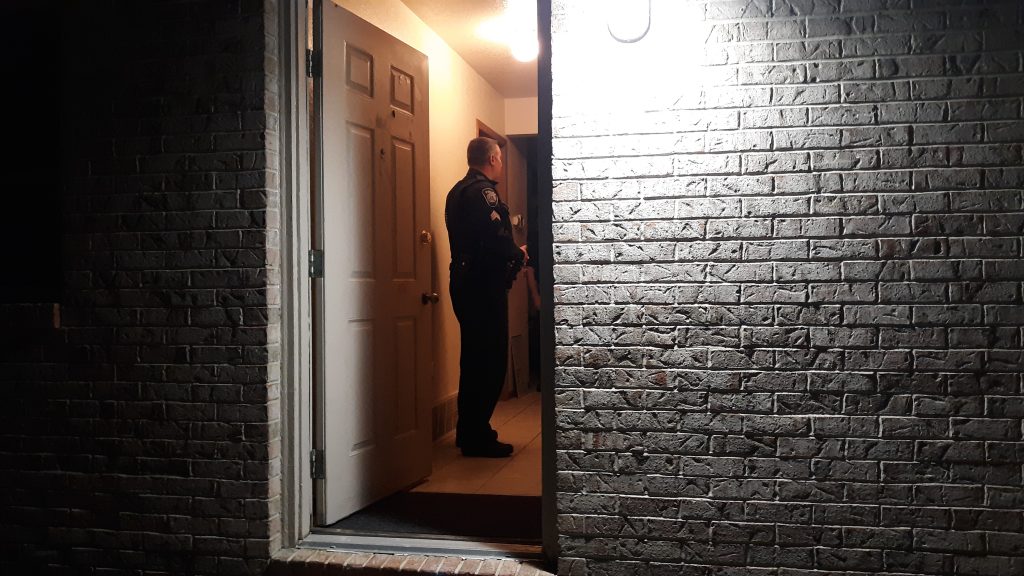
A cry for help
After midnight, a call comes in from an apartment on the west side of the city for a suspicious person trying to get in the back door. This was the second time the resident had called that night about someone possibly breaking in.
Officers respond and find the young woman frantic.
“He was pulling on the back door,” she said between sobs.
The police learned during the first visit that she was the victim of an assault in the past, and believed the same man was trying to break in. She tells police that she was too afraid to look at the door, but that she is sure someone was trying to get in.
“Do you mind if I come in and look at it,” one officer said, as another walked around the outside of the building.
While they find no evidence of someone trying to break in, the officers don’t want to leave the woman alone. They ask if she has any family or friends they can call to come stay with her. She replies that she just has one friend in the city, and he went out to the bars with friends. She tells them she has no car and no money.
“I’m so scared,” she cried. When she tells the police she is dehydrated, an officer offers to get her a glass of water.
Sensing that the woman needs help for more than they can provide, dispatch is asked to call Unison to send a mental health professional to the scene. They tell the woman they will make extra patrols at her apartment building. Unison doesn’t respond but the woman’s friend calls back after the bars close. He is too intoxicated to drive himself, so a police officer takes the woman to his apartment for the night.
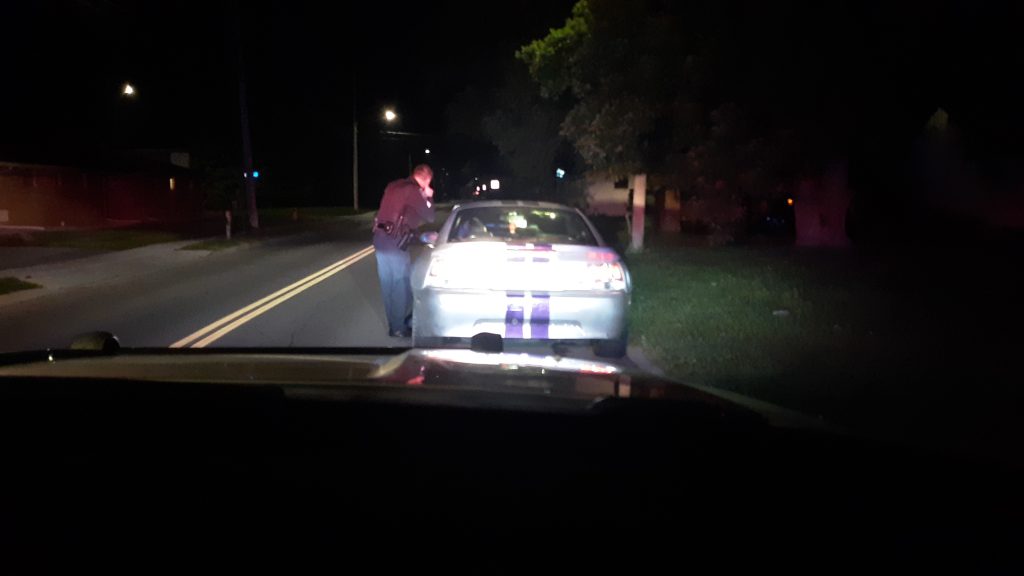
Who you gonna call?
The police have become the answer to all problems for some residents – especially in the middle of the night.
“At 3 in the morning, if the power goes out, if a naked guy is walking down the street, and if a house is broken into – people call the police,” Skaff said.
They get called about a family of geese hit by a car, and about suspected aliens.
“We are the go-to. We are who you are going to call,” Skaff said.
More and more of the calls involve people with mental health issues – so BGPD officers are trained in handling mental health problems. They work with Unison mental health workers to respond to critical situations.
“Mental health has just exploded,” Skaff said.

